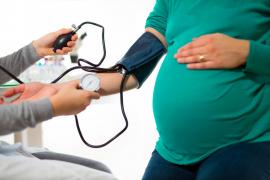
The Department of Health has urged all pregnant women to access antenatal care as early as possible and to follow a healthy lifestyle including avoiding smoking, drinking alcohol or using illegal drugs during pregnancy.
This, according to the department, will reduce the risk of preterm labour and premature birth, which is the leading cause of death in children under the age of five.
November is World Prematurity Month, a global movement to raise awareness of premature birth and the devastating impact it can have on families.
The department, in collaboration with various stakeholders, will host a hybrid event on Wednesday as part of sustained efforts to end preventable preterm births by ensuring pregnant women have full-term pregnancies and healthy babies.
Statistics show that about 15 million or one in 10 children babies globally are born preterm each year.
In South Africa, the department said an average of 15% or one in seven babies of all births are born prematurely annually.
Approximately 84 000 preterm infants are born in South Africa each year and 10% of premature infants are at increased risk of death and various other complications including respiratory, neurological and eye morbidities compared with full-term infants.
Pre-term is defined as babies born alive before 37 weeks of pregnancy are completed.
There are sub-categories of preterm birth, based on gestational age, and these include extreme cases of infants born less than 28 weeks and very pre-term of 28 to less than 32 weeks.
“It is recommended that pregnant women should attend all antenatal care visits or appointments throughout their pregnancy periods to enable the health professionals to monitor and assess the state of health of both the mother and unborn child to identify early signs and symptoms of manageable and life-threatening complications,” the department said.
These, according to the department, include pre-eclampsia, urinary tract infections and gestational diabetes.
The data shows that South Africa ranks 24th out of 184 countries with a high number of newborn deaths around the world due to complications from preterm birth.
The department, working with various stakeholders has developed strategies, programmes and other interventions to effectively manage complications and prevent avoidable deaths linked to prematurity in the country as part of a broader under-five child mortality prevention plan.
These comprise award-winning MomConnect – a cellphone-based technology with over 4.5 million subscribers, developed to create a platform to support pregnant women with health promotion messages translated into official languages to improve their health and that of their infants.
The other intervention is an early childhood development radio campaign called Side-by-Side, which reaches about 5.7 million audiences weekly through 11 SABC African language radio stations and social media platforms.
The recommendations as outlined in the Saving Mothers and Babies reports, include guidance on the management of conditions such as hypertensive disorders of pregnancy and infections, as well as management of preterm delivery for the mother-baby pair.
“The country will continue to implement programmes and initiatives to protect children against vaccine-preventable diseases including improvement of the Integrated Management of Childhood Illnesses (IMCI) services.”
Meanwhile, the country made a declaration of exclusive breastfeeding for all mothers including those living with HIV to exclusively breastfeed their babies for six months and to continue breastfeeding for at least 24 months.
Although the under-five mortality rate has declined from 74.7 per 1 000 live births in 2002 to 30.7 per 1000 live births in 2022, and infant mortality from 55.2 per 1 000 live births to in 2002 and 24.3, the department believes more still needs to be done to ensure that children reach their full potential in the country.
“The department has also intensified sexual reproductive health to improve access to effective contraception methods to reduce unintended pregnancies, unsafe abortions, and reproductive health complications, especially amongst girls and young women.” – SAnews.gov.za


